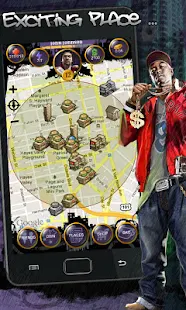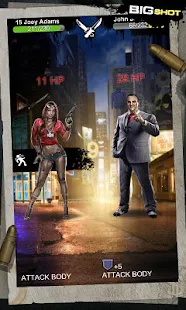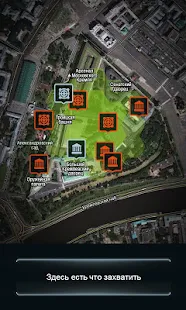Life after chekina
Chekina? No, have not heard. It is much more interesting not just to check in, but to capture, develop or sell real buildings and establishments! I have already talked about the geo-social games at KRI 2013 , and also did a review on Habré in August . But there it was mainly about the great and terrible Ingress and other Western projects, although domestic developers have already stepped onto the path of war for the real world. I collected a series of interviews with all existing geo-social games that are already closed and are still being developed by us. Part 1: BigShot, Geopoly and DigitWar.
bigshot.mobi
Status: Last updated April 2012.
Classic mafia mafia wars, reconsidered for the geo-social format, once conquered Facebook tops.




')
Michael, hello! Tell me, how did the Bigshot start?
With the idea. With the idea to combine geolocation activity and ordinary game mechanics. If people are interested in marking their activity on the map, and they do it sometimes out of boredom, why not base the game universes and settings that people have already tested and loved by people as a basis for eliminating this boredom.
What ideas have tried and prototypes done before coming to the release of the game?
There was no release of the game. There were several versions, in each of which we consistently tried to circumvent the obstacles and problems encountered. There are few players, they don’t see each other - they introduced global chat, ratings, in-game connections (friends), game locations with geolocation cancellation. All changes were aimed at finding a successful introduction of geolocation in the game world. Such that players do not encounter a void, and the game does not collapse on a small concentration of players per square kilometer of the real world. That, with which it was not possible to cope perfectly.
Are Foursquare and geo-social games oriented?
On Foursquare, yes, as a guarantee that geolocation binding to actions is relevant, relevant and interesting to people. There are no other geo-social games, because in May 2011 there were practically none, at least available for download in Russia.
What technologies were used for the client and for the server? Whose card engine?
On the server used Scala, Apache, PostgreSQL, Google protobuf. In the iOS client, Google Maps, samopisnye layout. Google Maps came up as a map without problems, and in fact at the beta stage of the license restrictions we didn’t really care.
Now come to the most difficult question. Why didn't the project take off?
In Bigshot, we simultaneously solved several tasks - a new mobile platform for us and its features, a new one for all the mechanics, not of gamification of geolocation, but of landing and geolocation of game activity. The whole project is an experiment on an experiment. We had positive reviews, the first beginnings of our gaming community, the first payments. But hopes for the rapid, viral growth of the project failed. Even taking into account the fact that in game mechanics we found a way to give players a part of eliminating geolocation as a game restriction, the growth rates were insufficient and there was an obvious need for significant marketing expenses.
Shadow Cities recently closed, one of the first geo-social games. Did not analyze what rake they stepped on?
Well, SC players believe that Google is to blame for everything and the output of the game Ingress. Rake geolocation games - geolocation. The main feature, it is - the main limitation for the players. Narrowing possible social ties, raising the bar for the number of participants required for an interesting game. Even in the game from Google, the most successful players are those who use “means of changing geolocation” - that is, cheats, and violate the key rule of the game. Even there to play in small towns is very boring and uninteresting.
Do you still believe that geo-social games have a future? Where do you think the niche will develop - in the geo-location and linkage to the terrain, in augmented reality, or in general into something new?
In one of their incarnations they will definitely find their niche and their players. Most likely this is not what we have seen lately. In the case of geolocation, it should not be artificially integrated into the game world, thereby limiting it, and game mechanics should be born or build up around the user's location or around his actions associated with a regular change of location.
For example, remembering that you need to go into the game when you arrived in another area of the city and you can get some kind of game bonus from it, take additional actions - well, not being able to play without changing location - is bad. Or to unite in groups and in such groups to collide with each other in the same area, the city is good. Not seeing anyone around in the game, simply because no one else is playing next to me - it’s bad.
Great, so is it worth waiting for new geo-social games from your team?
In the near future - is unlikely. We are following with interest what is happening in this area, because it is always interesting to watch how other teams implement projects similar to yours, solve the problems you faced. So it was a fascinating experiment, but it ended.
touchin.ru/portfolio/geopoly
Status: Closed in 2012
This is a virtual monopoly, all according to the canons - we buy buildings, we get rent, upgrade, we repeat. But now all the buildings are real, located on the streets of cities where they are in reality.


Andrew, hello! Tell me, how did Geopoly start?
Hello! It began with a dedication to mobile devices amid a wave of success of social games. The idea is quite simple - to bring the real world into the virtual world with reference to the place where you are, plus add sociality and virality. As soon as you imagine this, you immediately begin to believe that millions will play the game.
What ideas have tried and prototypes done before coming to the release of the game?
The idea was from the beginning. Prototyped mainly interaction with various APIs, since There are a lot of them to determine the nearest objects, but each had its own problems.
Are Foursquare and geo-social games oriented?
Of course they looked. The main game that was focused on was MyTown from Booyah. It was all the same, but there was no PvP. In fact, it was a farm where you just bought a bunch of buildings and played with yourself. We also looked at other projects, then there were not many of them, but about 5 of them were recruited, now I don’t remember the names.
What technologies were used for the client and for the server? Whose card engine?
For development for iOS, the Xamarin framework was used. By the way, we are still successfully using it in our new mobile application development company. The map itself was standard for iOS (at that time, Google Maps), but I had to tinker with the geolocation API. Then there were many different ways to find out which objects are near you. Foursquare API, Google Places, OpenStreetMap, Facebook Places, AlterGeo, VK, SimpleGeo. But each had either limits on the number of requests (which, of course, did not suit us, with our dreams of millions of users, or the objects themselves were few and of poor quality. As a result, we settled on Facebook Places, but we had to demand its use login through Facebook, which significantly reduced the audience of the project.
Now come to the most difficult question. Why didn't the project take off?
The main problem is the ill-conceived game mechanics. I started the project as a programmer who has a cool game idea. We did the development perfectly and on time, but the mechanics turned out badly. Already in the middle, I realized that I needed to look for a game designer, but it was too late and I had to go into everything myself. As a result, the game turned out to be interesting, but quickly got bored, the majority of players played it for several hours and then forgot it.
We considered various conversions, but there was little point in this because We could not influence them. Naturally, your share was made and logged in through Facebook - after installing the application, only half of the users logged in, the rest of them logged off the social network and they deleted the game.
Now I would do everything from the very beginning - I would look for a cool game designer with experience and take him to share. At the same time, it would be worthwhile to make a bet not on one product but on several, sometimes it is difficult to predict what will take off.
Shadow Cities recently closed, one of the first geo-social games. Did not analyze what rake they stepped on?
Unfortunately, now I’m not following the geo-social games, all my strength is spent on a business that has come out of Geopoly - the development of custom mobile applications. But I can assume, because In addition to Geopoly, we were developing a similar project for Innova Systems, which was called DigitWar.
The main problem of geo-social games is that they are GEO, i.e. they need to move. And the players are initially very lazy, their routes are limited and mostly they play sitting in one place, be it work or a place of study. As I recall, in Shadow Cities there was a strong enough binding to the location, it seems to me that it repelled the lazy part of the audience.
In DigitWar, this problem was solved by the possibility of teleportation. It was possible to sit in one place and at the same time seize buildings in another, having moved there for a certain time. This significantly varied the gameplay, but this was not enough for the game to shoot.
Do you still believe that geo-social games have a future? Where do you think the niche will develop - in the geo-location and linkage to the terrain, in augmented reality, or in general into something new?
I believe, but it must be something radically new, or strongly promoted by one of the major publishers. Any arcade or social network is much easier to gain an audience than a geolocation game.
Many already tried the banal peg, but it never took off. I don’t believe in complemented reality - it’s rather a fun toy, but by no means a serious tool for creating a quality game. Perhaps it will be able to fix glasses like Google Glass, but it will not be soon.
Yes, we take even the banal Foursquare and Instagram. The comparison is certainly not entirely correct, but the first 40M users, and the second one has 150M. Checking in and capturing places is interesting, but not as simple as consuming a visual photo frame. Users are lazy. Therefore, Foursquare has long turned to the search for interesting places nearby than just check-ins and achivki.
Great, so is it worth waiting for new geo-social games from your team?
Not! Now we will not do our projects soon; we have enough experience of one startup! Now we at Touch Instinct are building a serious mobile application development business that brings money from the very beginning. Yes, this is not a yard history and we will not go to the IPO, but we will not close in a year or two as 99.9% of startups. By the way, in 2.5 years we have already 40 people and quite a serious turn. And after all, a well-known fact - during the times of the Gold Rush, those who sold instruments earned the most.
digitwar.ru
Status: last updated February 2013
The task of the player: to capture objects of the real world - cafes, restaurants, etc. All play with the same objects, one game world for all. Each player has resources - the pixels, he spends them on what would capture other people's object and protect their own. Resources produce captured player objects. The object can be captured only if you are physically nearby.




Hello Seraphim! I am a little aware of the history of the project, but tell readers how did DigitWar start?
The project began as part of an experimental marketing campaign. The task of the game was to attract a mass audience, and then translate it into our large, non-mobile projects. We wanted to make a very fast and dynamic game with a short minimum gaming session, so that people could play even in public transport, even in traffic jams.
But the game was supposed to be only part of a global company being developed. At a certain stage, business priorities changed and the project was turned off. I decided to single out the game as a separate project and complete the development. The new goal was to research the mobile market and gain experience publishing games on it. Further development up to release and launch was carried out already in the experiment mode, a startup.
What ideas have tried and prototypes done before coming to the release of the game?
The mechanics were almost entirely invented before the start of development and changed only in the direction of simplification. Quite a lot of features were thrown, not only from the point of view of Lean ideology, but also for unloading the gameplay. The first prototypes were still without design and were actively played up by us, developers, and friends. In particular, one of these playtests pushed one of the most important features into the game - the teleportation function, which allows you to capture objects not only around your real geographic location.
Are Foursquare and geo-social games oriented?
Everything was watched and studied. Foursquare is not a game, but the gross passion for mayorism certainly played a role in coming up with the basic mechanics. Geo-social games that looked were pushing to the conclusion that we didn’t need it - everything that came across as a rule was pretty hardcore and niche, we wanted a crowd. Actually, including examples of other games pushed to simplify the gameplay.
What technologies used? Whose card engine?
All code was written by .Net outsourcers. Maps Google Maps, list of objects received Google Places.
Using Google Maps - what are the pros and cons? Have you thought about the future, what restrictions will the license have to face?
When designed we studied everything that was on the market. Studied Foursquare, Facebook places, Google Places, 2Gis. Foursquare did not fit in the first place because of the large number of fake objects and the ease of adding new ones, Facebook places need to log in via FB, 2Gis did not show much interest at the negotiation stage, so the choice fell on Google Places.
With Google Places there was a major risk - a quota of 10'000 requests per day. The issue was decided in direct negotiations with Google. They are interested in the project and we have expanded the quota at the time of launch.
Now come to the most difficult question. Why didn't the project take off?
The game first brought us the necessary experience in mobile publishing and working with MMO in the mobile segment. The main goal she fulfilled. So in this regard, everything flew up.
Then it was necessary to either assemble a team and develop an in-house project, i.e. in essence, do your studio, or close the project, because It was impossible to work with a project on outsourcing with the dynamics required by the players. Yes, it was possible to remain on the outsource, but to go to the time & material, but this was not suitable for financial reasons. In my plans and plans of the company at that time there was no opening of the studio, especially for one single project - there were significantly more important tasks. It is a pity, but the most reasonable thing at that time was to close the project.
Shadow Cities recently closed, one of the first geo-social games. Did not analyze what rake they stepped on?
The game was watched only at the initial stages of our project. At that time, she seemed too hardcore and tightly tied to geolocation + requiring too much attention from the player, although certainly very beautiful. I didn’t carry out a deep analysis after closing, but I think that the reason is just in hardcore and too big visual bets. In my opinion, the visual is important in order to attract the player, then it must keep the gameplay.
Do you still believe that geo-social games have a future?
I believe that the future is for good games, and geo-sociality is just a trick. Will there be any good games with a geo-social feature in the future ?! I hope so. Chip cool.
But I do not think that the segmentation of games by geo-location chip makes sense. Is it possible to screw the geo-location as a chip in the arcade? I think yes. In MMO? Yes of course. Whether they get from this in one segment - I do not think.
In the second part you are waiting for an interview with bombsquare, City of Heroes, and possibly Cashsquare.
Bigshot
bigshot.mobi
Status: Last updated April 2012.
Classic mafia mafia wars, reconsidered for the geo-social format, once conquered Facebook tops.
')
Michael, hello! Tell me, how did the Bigshot start?
With the idea. With the idea to combine geolocation activity and ordinary game mechanics. If people are interested in marking their activity on the map, and they do it sometimes out of boredom, why not base the game universes and settings that people have already tested and loved by people as a basis for eliminating this boredom.
What ideas have tried and prototypes done before coming to the release of the game?
There was no release of the game. There were several versions, in each of which we consistently tried to circumvent the obstacles and problems encountered. There are few players, they don’t see each other - they introduced global chat, ratings, in-game connections (friends), game locations with geolocation cancellation. All changes were aimed at finding a successful introduction of geolocation in the game world. Such that players do not encounter a void, and the game does not collapse on a small concentration of players per square kilometer of the real world. That, with which it was not possible to cope perfectly.
Are Foursquare and geo-social games oriented?
On Foursquare, yes, as a guarantee that geolocation binding to actions is relevant, relevant and interesting to people. There are no other geo-social games, because in May 2011 there were practically none, at least available for download in Russia.
What technologies were used for the client and for the server? Whose card engine?
On the server used Scala, Apache, PostgreSQL, Google protobuf. In the iOS client, Google Maps, samopisnye layout. Google Maps came up as a map without problems, and in fact at the beta stage of the license restrictions we didn’t really care.
Now come to the most difficult question. Why didn't the project take off?
In Bigshot, we simultaneously solved several tasks - a new mobile platform for us and its features, a new one for all the mechanics, not of gamification of geolocation, but of landing and geolocation of game activity. The whole project is an experiment on an experiment. We had positive reviews, the first beginnings of our gaming community, the first payments. But hopes for the rapid, viral growth of the project failed. Even taking into account the fact that in game mechanics we found a way to give players a part of eliminating geolocation as a game restriction, the growth rates were insufficient and there was an obvious need for significant marketing expenses.
Shadow Cities recently closed, one of the first geo-social games. Did not analyze what rake they stepped on?
Well, SC players believe that Google is to blame for everything and the output of the game Ingress. Rake geolocation games - geolocation. The main feature, it is - the main limitation for the players. Narrowing possible social ties, raising the bar for the number of participants required for an interesting game. Even in the game from Google, the most successful players are those who use “means of changing geolocation” - that is, cheats, and violate the key rule of the game. Even there to play in small towns is very boring and uninteresting.
Do you still believe that geo-social games have a future? Where do you think the niche will develop - in the geo-location and linkage to the terrain, in augmented reality, or in general into something new?
In one of their incarnations they will definitely find their niche and their players. Most likely this is not what we have seen lately. In the case of geolocation, it should not be artificially integrated into the game world, thereby limiting it, and game mechanics should be born or build up around the user's location or around his actions associated with a regular change of location.
For example, remembering that you need to go into the game when you arrived in another area of the city and you can get some kind of game bonus from it, take additional actions - well, not being able to play without changing location - is bad. Or to unite in groups and in such groups to collide with each other in the same area, the city is good. Not seeing anyone around in the game, simply because no one else is playing next to me - it’s bad.
Great, so is it worth waiting for new geo-social games from your team?
In the near future - is unlikely. We are following with interest what is happening in this area, because it is always interesting to watch how other teams implement projects similar to yours, solve the problems you faced. So it was a fascinating experiment, but it ended.
Geopoly
touchin.ru/portfolio/geopoly
Status: Closed in 2012
This is a virtual monopoly, all according to the canons - we buy buildings, we get rent, upgrade, we repeat. But now all the buildings are real, located on the streets of cities where they are in reality.


Andrew, hello! Tell me, how did Geopoly start?
Hello! It began with a dedication to mobile devices amid a wave of success of social games. The idea is quite simple - to bring the real world into the virtual world with reference to the place where you are, plus add sociality and virality. As soon as you imagine this, you immediately begin to believe that millions will play the game.
What ideas have tried and prototypes done before coming to the release of the game?
The idea was from the beginning. Prototyped mainly interaction with various APIs, since There are a lot of them to determine the nearest objects, but each had its own problems.
Are Foursquare and geo-social games oriented?
Of course they looked. The main game that was focused on was MyTown from Booyah. It was all the same, but there was no PvP. In fact, it was a farm where you just bought a bunch of buildings and played with yourself. We also looked at other projects, then there were not many of them, but about 5 of them were recruited, now I don’t remember the names.
What technologies were used for the client and for the server? Whose card engine?
For development for iOS, the Xamarin framework was used. By the way, we are still successfully using it in our new mobile application development company. The map itself was standard for iOS (at that time, Google Maps), but I had to tinker with the geolocation API. Then there were many different ways to find out which objects are near you. Foursquare API, Google Places, OpenStreetMap, Facebook Places, AlterGeo, VK, SimpleGeo. But each had either limits on the number of requests (which, of course, did not suit us, with our dreams of millions of users, or the objects themselves were few and of poor quality. As a result, we settled on Facebook Places, but we had to demand its use login through Facebook, which significantly reduced the audience of the project.
Now come to the most difficult question. Why didn't the project take off?
The main problem is the ill-conceived game mechanics. I started the project as a programmer who has a cool game idea. We did the development perfectly and on time, but the mechanics turned out badly. Already in the middle, I realized that I needed to look for a game designer, but it was too late and I had to go into everything myself. As a result, the game turned out to be interesting, but quickly got bored, the majority of players played it for several hours and then forgot it.
We considered various conversions, but there was little point in this because We could not influence them. Naturally, your share was made and logged in through Facebook - after installing the application, only half of the users logged in, the rest of them logged off the social network and they deleted the game.
Now I would do everything from the very beginning - I would look for a cool game designer with experience and take him to share. At the same time, it would be worthwhile to make a bet not on one product but on several, sometimes it is difficult to predict what will take off.
Shadow Cities recently closed, one of the first geo-social games. Did not analyze what rake they stepped on?
Unfortunately, now I’m not following the geo-social games, all my strength is spent on a business that has come out of Geopoly - the development of custom mobile applications. But I can assume, because In addition to Geopoly, we were developing a similar project for Innova Systems, which was called DigitWar.
The main problem of geo-social games is that they are GEO, i.e. they need to move. And the players are initially very lazy, their routes are limited and mostly they play sitting in one place, be it work or a place of study. As I recall, in Shadow Cities there was a strong enough binding to the location, it seems to me that it repelled the lazy part of the audience.
In DigitWar, this problem was solved by the possibility of teleportation. It was possible to sit in one place and at the same time seize buildings in another, having moved there for a certain time. This significantly varied the gameplay, but this was not enough for the game to shoot.
Do you still believe that geo-social games have a future? Where do you think the niche will develop - in the geo-location and linkage to the terrain, in augmented reality, or in general into something new?
I believe, but it must be something radically new, or strongly promoted by one of the major publishers. Any arcade or social network is much easier to gain an audience than a geolocation game.
Many already tried the banal peg, but it never took off. I don’t believe in complemented reality - it’s rather a fun toy, but by no means a serious tool for creating a quality game. Perhaps it will be able to fix glasses like Google Glass, but it will not be soon.
Yes, we take even the banal Foursquare and Instagram. The comparison is certainly not entirely correct, but the first 40M users, and the second one has 150M. Checking in and capturing places is interesting, but not as simple as consuming a visual photo frame. Users are lazy. Therefore, Foursquare has long turned to the search for interesting places nearby than just check-ins and achivki.
Great, so is it worth waiting for new geo-social games from your team?
Not! Now we will not do our projects soon; we have enough experience of one startup! Now we at Touch Instinct are building a serious mobile application development business that brings money from the very beginning. Yes, this is not a yard history and we will not go to the IPO, but we will not close in a year or two as 99.9% of startups. By the way, in 2.5 years we have already 40 people and quite a serious turn. And after all, a well-known fact - during the times of the Gold Rush, those who sold instruments earned the most.
Digit war
digitwar.ru
Status: last updated February 2013
The task of the player: to capture objects of the real world - cafes, restaurants, etc. All play with the same objects, one game world for all. Each player has resources - the pixels, he spends them on what would capture other people's object and protect their own. Resources produce captured player objects. The object can be captured only if you are physically nearby.
Hello Seraphim! I am a little aware of the history of the project, but tell readers how did DigitWar start?
The project began as part of an experimental marketing campaign. The task of the game was to attract a mass audience, and then translate it into our large, non-mobile projects. We wanted to make a very fast and dynamic game with a short minimum gaming session, so that people could play even in public transport, even in traffic jams.
But the game was supposed to be only part of a global company being developed. At a certain stage, business priorities changed and the project was turned off. I decided to single out the game as a separate project and complete the development. The new goal was to research the mobile market and gain experience publishing games on it. Further development up to release and launch was carried out already in the experiment mode, a startup.
What ideas have tried and prototypes done before coming to the release of the game?
The mechanics were almost entirely invented before the start of development and changed only in the direction of simplification. Quite a lot of features were thrown, not only from the point of view of Lean ideology, but also for unloading the gameplay. The first prototypes were still without design and were actively played up by us, developers, and friends. In particular, one of these playtests pushed one of the most important features into the game - the teleportation function, which allows you to capture objects not only around your real geographic location.
Are Foursquare and geo-social games oriented?
Everything was watched and studied. Foursquare is not a game, but the gross passion for mayorism certainly played a role in coming up with the basic mechanics. Geo-social games that looked were pushing to the conclusion that we didn’t need it - everything that came across as a rule was pretty hardcore and niche, we wanted a crowd. Actually, including examples of other games pushed to simplify the gameplay.
What technologies used? Whose card engine?
All code was written by .Net outsourcers. Maps Google Maps, list of objects received Google Places.
Using Google Maps - what are the pros and cons? Have you thought about the future, what restrictions will the license have to face?
When designed we studied everything that was on the market. Studied Foursquare, Facebook places, Google Places, 2Gis. Foursquare did not fit in the first place because of the large number of fake objects and the ease of adding new ones, Facebook places need to log in via FB, 2Gis did not show much interest at the negotiation stage, so the choice fell on Google Places.
With Google Places there was a major risk - a quota of 10'000 requests per day. The issue was decided in direct negotiations with Google. They are interested in the project and we have expanded the quota at the time of launch.
Now come to the most difficult question. Why didn't the project take off?
The game first brought us the necessary experience in mobile publishing and working with MMO in the mobile segment. The main goal she fulfilled. So in this regard, everything flew up.
Then it was necessary to either assemble a team and develop an in-house project, i.e. in essence, do your studio, or close the project, because It was impossible to work with a project on outsourcing with the dynamics required by the players. Yes, it was possible to remain on the outsource, but to go to the time & material, but this was not suitable for financial reasons. In my plans and plans of the company at that time there was no opening of the studio, especially for one single project - there were significantly more important tasks. It is a pity, but the most reasonable thing at that time was to close the project.
Shadow Cities recently closed, one of the first geo-social games. Did not analyze what rake they stepped on?
The game was watched only at the initial stages of our project. At that time, she seemed too hardcore and tightly tied to geolocation + requiring too much attention from the player, although certainly very beautiful. I didn’t carry out a deep analysis after closing, but I think that the reason is just in hardcore and too big visual bets. In my opinion, the visual is important in order to attract the player, then it must keep the gameplay.
Do you still believe that geo-social games have a future?
I believe that the future is for good games, and geo-sociality is just a trick. Will there be any good games with a geo-social feature in the future ?! I hope so. Chip cool.
But I do not think that the segmentation of games by geo-location chip makes sense. Is it possible to screw the geo-location as a chip in the arcade? I think yes. In MMO? Yes of course. Whether they get from this in one segment - I do not think.
To be continued
In the second part you are waiting for an interview with bombsquare, City of Heroes, and possibly Cashsquare.
Source: https://habr.com/ru/post/205798/
All Articles